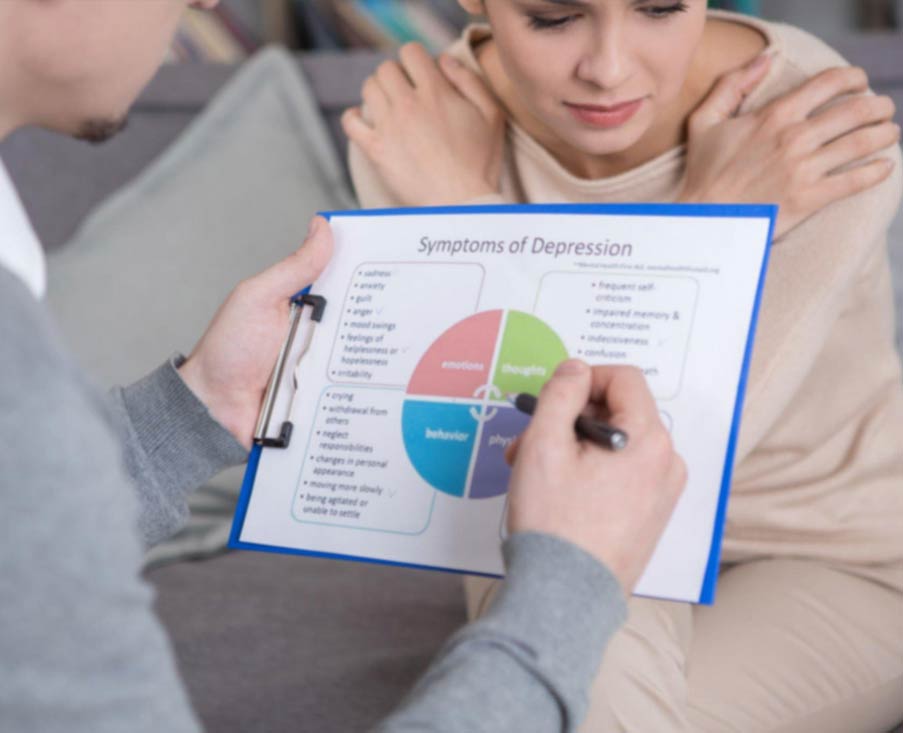Anxiety and depression are prevalent mental health issues that frequently coexist and have a significant impact on a person’s health. People who experience anxiety or depression sometimes ask if the two disorders are related or if sorrow might cause anxiety. In this post, we’ll discuss the connections between sorrow and anxiety and how those connections affect your mental health and general wellbeing. We’ll also discuss how crucial it is to deal with anxiety and depression and how anxiety treatment center in largo can offer patients complete support and aid in recovery.
Depression and Anxiety: What You Need to Know
The Complex Relationship: Anxiety Leading to Depression
The Impact of Anxiety and Depression on Mental Health
The coexistence of anxiety and depression can significantly affect a person’s overall mental health and quality of life. These disorders’ severe symptoms can have an impact on daily activities, social relationships, and over all work performance. Ongoing anxiety and depression can lead to social isolation and a decline in self-esteem. It is important to address these conditions as soon as possible in order to prevent more problems and to increase one’s chances of improving their mental health.
Recognizing Depression and Anxiety Symptoms

The wellness of someone can be significantly impacted by common mental health conditions including depression and anxiety. Knowing the signs of these illnesses is essential for early diagnosis and successful treatment. People and their loved ones can seek the right assistance and treatments by being aware of the symptoms of sadness and anxiety. The main signs of depression and anxiety are listed here, giving a general overview to raise awareness and encourage pro-active mental health care.
- Persistent sadness or feelings of emptiness
- Loss of interest or pleasure in activities once enjoyed
- Changes in appetite or weight
- Sleep disturbances (insomnia or excessive sleeping)
- Fatigue or lack of energy
- Feelings of worthlessness or excessive guilt
- Difficulty concentrating or making decisions
- Restlessness or slowed movements
- Recurring thoughts of death or suicide
- Excessive worry or apprehension
- Restlessness or feeling on edge
- Fatigue or difficulty sleeping
- Difficulty concentrating or controlling racing thoughts
- Irritability
- Muscle tension or aches
- Rapid heartbeat or palpitations
- Shortness of breath or feeling out of breath
- Sweating or trembling
The Role of Anxiety Treatment Center in Largo
In order to help those who are battling with anxiety and its likely associated with depression, anxiety treatment facilities are essential. With an emphasis on evidence-based therapy, pharmaceutical management (where required), and holistic interventions to address the physical, emotional, and psychological elements of anxiety and depression, these facilities provide complete treatment.
Diagnosis and Assessment
Anxiety treatment center in Largo typically begin with a thorough evaluation to understand the individual’s unique challenges, symptoms, and underlying causes. This assessment helps develop a personalized treatment plan tailored to the individual’s specific needs.
Psychotherapy and Counseling
Therapy is a cornerstone of anxiety and depression treatment. Anxiety treatment centers offer various therapeutic modalities, including cognitive-behavioral therapy (CBT), which helps individuals identify and modify negative thought patterns and behaviors. Other approaches such as dialectical behavior therapy (DBT) and mindfulness-based therapies can also be effective in managing anxiety and depression symptoms.
Medication Management
In some cases, medication may be prescribed to alleviate severe anxiety and depression symptoms. Anxiety treatment centers have qualified healthcare professionals who can assess the need for medication, prescribe appropriate medications, and monitor their effectiveness while ensuring the individual’s overall well-being.
Interventions on a Holistic Level
Anxiety treatment centers often incorporate complementary therapies and holistic interventions to enhance the overall well-being of individuals. These may include relaxation techniques, meditation, yoga, art therapy, and stress management techniques. These practices help individuals develop coping mechanisms, reduce anxiety, and promote emotional resilience.
Supportive Environment
Anxiety treatment centers offer a supportive and nurturing environment where individuals can connect with others who share similar experiences. Group therapy and support groups allow individuals to share their struggles, learn from one another, and receive encouragement and validation. Being in a community of individuals who understand their challenges can alleviate feelings of isolation and provide a sense of belonging.
Lifestyle Modifications
Anxiety treatment centers emphasize the importance of adopting a healthy lifestyle to support mental well-being. This includes promoting regular exercise, adequate sleep, a nutritious diet, and stress reduction techniques. Engaging in activities that bring joy and relaxation can also contribute to overall mood improvement and symptom management.

